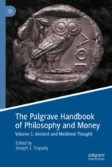Search
Search Results
-
Cryonics, euthanasia, and the doctrine of double effect
In 1989, Thomas Donaldson requested the California courts to allow physicians to hasten his death. Donaldson had been diagnosed with brain cancer,...
-
Goods, causes and intentions: problems with applying the doctrine of double effect to palliative sedation
BackgroundPalliative sedation and analgesia are employed in patients with refractory and intractable symptoms at the end of life to reduce their...
-
Double Effect
Double effect refers to the moral legitimacy of an action that causes serious harm as an involuntary, unpredictable, or unavoidable side effect of...
-
Intentions and the Doctrine of Double Effect
This chapter explores the nature of intention and ‘double effect’ in the moral evaluation of action. It begins with an explanation of the historical...
-
Nietzsche’s Doctrine of eternal recurrence
Nietzsche, like any thinker, may be approached at the point of least resistance, or at the point of greatest resistance. We encounter little...
-
From the Sequence of the Sun-Goddess (bhānavīkrama) to Time-Consumption (kālagrāsa): Some Notes on the Development of the Śākta Doctrine of the Twelve Kālīs
The doctrine of the twelve Kālīs is one of the earliest developments of the Śākta tradition of the Kālīkula/Kālīkrama/Mahānaya and it is well known...
-
Sosa’s AAA Model and Epistemic Double Effects
There are many important connections between epistemic justification and moral justification. A recent example of such connections is offered by...
-
The Doctrine of Double Effect and Killing Animals for Food
Producing food on a large scale without killing any animals seems currently impossible. This poses a challenge for deontological positions that...
-
Triple Effect
This chapter discusses a rival strategy to ours for interpreting the Scriptures, based on philosophical work by F. M. Kamm (1948–). Before Kamm’s...
-
Habermas, Popular Sovereignty, and the Legitimacy of Law
Habermas’ theory of popular sovereignty has received comparatively little sustained critical attention in the Anglo-American literature since initial...
-
A Revised Moral Appraisal of Early Induction of Labor in Cases of Anencephaly
The central concern of this article is whether early induction of labor for an anencephalic fetus can ever be morally justified, particularly by a...
-
The Principle of Double Effect and Just War Theory
The paper explores the relationship between the Principle of Double Effect (PDE) and Just War Theory (JWT), with emphasis on their relationship in...
-
Re-presentation in Avicenna’s Doctrine of Knowledge
Avicenna’s doctrine of knowledge is known for its complexity, and modern scholars have offered different if not contradictory interpretations of its...
-
Objections and Concerns
This chapter responds to some objections and concerns. First, it discusses some Scriptural passages that might be adduced against the book’s thesis...
-
Ethical Dilemmas at the End of Life Brain Death and Palliative Sedation
This chapter offers a comprehensive examination of the concept of brain death, exploring its historical and bio-philosophical background. It also...
-
Usury in Medieval Christianity
In this chapter I provide a critical overview of medieval Christian views on the morality of moneylending—focusing in particular on the philosophical...
-
Javelli and the Reception of the Scotist System of Distinctions in Renaissance Thomism
This chapter uncovers a less investigated aspect of the relationship between the two most important scholastic schools of the Renaissance, Thomism...
-
Why homoeopathy is pseudoscience
Homoeopathy is commonly recognised as pseudoscience. However, there is, to date, no systematic discussion that seeks to establish this view. In this...
-
The Double Face of Habits: Time and Timeless in Pragmatic Experience
According to Charles S. Peirce (1839–1914), phenomenology is the first science of philosophy. It houses, according to him, three universal forms of...
-
Writing, Violence and Writing the Non-Western Other in Business Ethics: Toward an Ethics of Alterity
This article examines how the textual rendering of the non-Western Other in Business Ethics in the West often remains a misrepresentation. Informed...
